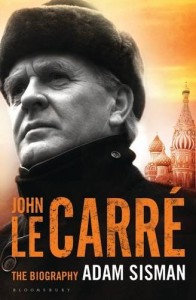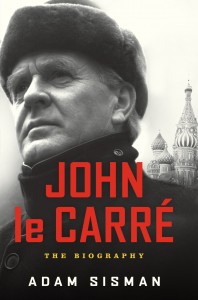 Published by Bloomsbury UK, Harper US
Published by Bloomsbury UK, Harper US
672pp, hardback, £25.00/ $28.99
Reviewed by N.J. Cooper
Is John le Carré one of the greatest English novelists of the post-war era or a writer of overblown commercial thrillers? Adam Sisman’s brilliant and exhaustive biography describes the reception of each of the novels, offering the contradictory judgements of writers from Anthony Burgess to Philip Roth, but he himself does not come down on one side or the other. I have to declare an interest here: I love most of the novels, particularly the George Smiley sequence, and can re-read them with huge pleasure.
Le Carré’s great subject is betrayal, and Adam Sisman reveals the roots of this obsession. Le Carré – or David Cornwell as he is in real life – has been both victim of treachery and a betrayer in his turn. His father, Ronnie, was a conman, whose crowd of victims includes some astonishing names. He forced David and his elder brother to run errands for him, involving them in his crimes. On one occasion he sent them to Paris to collect money for illegal shipments of unbranded whisky from the Panamanian ambassador. He also wanted them to collect the golf clubs he’d left at the George V Hotel. In fact, he had already taken money for the whisky and never delivered it, and he had been unable to pay the hotel bill and had therefore been forced to leave the clubs as security. The two boys, without money, had to sleep with the tramps under one of the Seine bridges until they could get home.
Their mother had run away from an intolerable life, without taking any measures to protect her young sons. David was brutally beaten at boarding school and, possibly, abused.  He left early and bravely took himself to Switzerland to take a course at Bern University. Here he had his first encounter with British intelligence and ran some spying errands. Returning to England, he went up to Oxford, spied on his friends, left early to marry and take a teaching job, went back to Oxford and took his degree. He taught at Eton, worked for MI5 and MI6, and went on to become the bestselling author of The Spy Who Came in From the Cold, which allowed him to leave his job to write full time.
He left early and bravely took himself to Switzerland to take a course at Bern University. Here he had his first encounter with British intelligence and ran some spying errands. Returning to England, he went up to Oxford, spied on his friends, left early to marry and take a teaching job, went back to Oxford and took his degree. He taught at Eton, worked for MI5 and MI6, and went on to become the bestselling author of The Spy Who Came in From the Cold, which allowed him to leave his job to write full time.
Sisman traces the writer’s life, achievements, friends and enemies, always showing how he used them in the novels. Some people are reported to have been hurt to recognize themselves in his fictional versions of their characters. On the way to unpicking the links between life and work, Sisman offers some shocking stories. One particularly nasty one involves the late politician and diarist Alan Clark, whose behaviour caused le Carré to end their friendship. Another tells of an outrageous publishing indiscretion. When Susan Kennaway wrote about the triangular relationship between her husband, James, and a deliberately unidentified ‘David’ (which inspired le Carré’s Naïve and Sentimental Lover), his real identity leaked out. On digging a little, Susan Kennaway discovered that, in spite of her publisher’s promises of secrecy, ‘copies sent out to reviewers had contained a note, to the effect that “Mrs Kennaway doesn’t want you to mention that the person named David in this book is really John le Carré”.’
One of the repeated criticisms of le Carré’s work is that his female characters are unconvincing. Various explanations have been given for this, ranging from a mistrust of women after the departure of his mother to a never-satisfied longing for all-consuming love. Sisman does not address the possibility that some of the women in le Carré’s fiction may, in fact, represent aspects of himself. George Smiley’s wife is notoriously unfaithful. In Tinker Tailor Soldier Spy, Smiley is described as being mortified to discover that she had followed her affair with the traitor Bill Haydon with as many others as she could achieve. Sisman writes that after the adulterous affair with Susan Kennaway, le Carré ‘met a very beautiful young student, with whom he went to bed. It was his first sexual experience that was wholly gratifying and it made him astonishingly happy…half in frenzy he emulated James [Kennaway]’s exploits in Paris the previous summer, taking woman after woman to bed, barely sleeping, drinking and drying out in saunas.’ His second wife has ‘suffered David’s extramarital adventures, and tried to protect him from their consequences…. “Nobody can have all of David,” she said recently.’
The man who emerges from Adam Sisman’s research and analysis would be a wonderful dinner companion – clever, funny, always entertaining – but on the basis of the 600 pages of this wonderful biography you would have to be very brave to want to get much closer to him.
